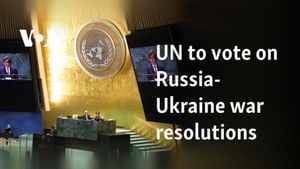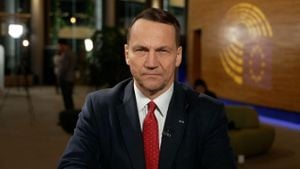Premier Panyaza Lesufi has set his ambitions high as he announces plans to introduce Swahili and Mandarin as subjects in Gauteng’s public schools. This announcement was made during Unisa’s 25th International Mother Language Day event held in Pretoria, where Lesufi emphasized the need for students to acquire foreign language skills to thrive in the global economy, particularly with China’s rising influence.
"Swahili and Mandarin, we are going to announce in our State of the Province Address, will be subjects offered to our children... so we can participate in other economies," Lesufi stated, underscoring the urgency of fostering multilingualism among South African students to keep up with Africa’s dynamic economic shifts.
Lesufi also remarked on the shifting global economic dynamics, where new players such as China are becoming increasingly significant. "We are now, as the Gauteng government, of the view...that there are new big players in the economy, and these include China. If we have to compete...our children must be equipped with these language skills," he noted.
The initiative to incorporate Mandarin as part of the education syllabus is not new. It has been under consideration for nearly a decade, stemming from efforts launched back in 2015 by the former Basic Education Minister Angie Motshekga, who issued a government notice advocating for Mandarin to be available as a subject since it would strengthen educational ties with China.
Swahili, on the other hand, stands as an official language of the East African Community and is increasingly being recognized as pivotal for fostering unity within Africa. According to Motshekga, "The introduction of Kiswahili as a Second Additional Language...will go a long way toward decolonising education... and assist...to unify Africa as a single market." This language expansion aims not only to improve student opportunities but also serves to build greater social cohesion across the continent.
Despite previous setbacks due to the COVID-19 pandemic, government departments remain committed to implementing Swahili at schools. The initial timeline set to pilot the language between 2021 and 2023 was postponed, but discussions are now underway to revive these plans.
Lesufi's commitment to promoting multilingualism extends beyond just these two languages. During his speech, he pointed out the importance of investing financially in South Africa’s linguistic diversity, highlighting how languages, particularly indigenous ones, help preserve culture. "If we don’t invest in our language, our languages will die..." he asserted, reinforcing the need to support African languages alongside new introductions.
To back this initiative, Gauteng’s government has set aside R35 million to support various language-based programs aimed at eleviating the status of less-commonly spoken languages. Some of these funds are intended to nurture young black writers focusing on education materials and literature available to children, particularly those written in indigenous languages. "We emphasise the economic value of languages and their role...in promoting inclusive growth, employment and innovation," Lesufi stated during his address.
South Africa's multilingual society, where languages like isiZulu, isiXhosa, Afrikaans, Semi, and Setswana are spoken by millions, reflects the rich cultural fabric of the nation. The Gauteng Premier reiterated the necessity of supporting all languages, no matter their historic status, since they are integral to both cultural identity and economic participation.
With the introduction of Swahili and Mandarin, Gauteng aims to not only improve educational outcomes but also make significant strides toward strengthening its relationship with key economic partners and promoting African unity. The future could see Gauteng’s students equipped not just academically, but also linguistically, to engage effectively on the global stage.



